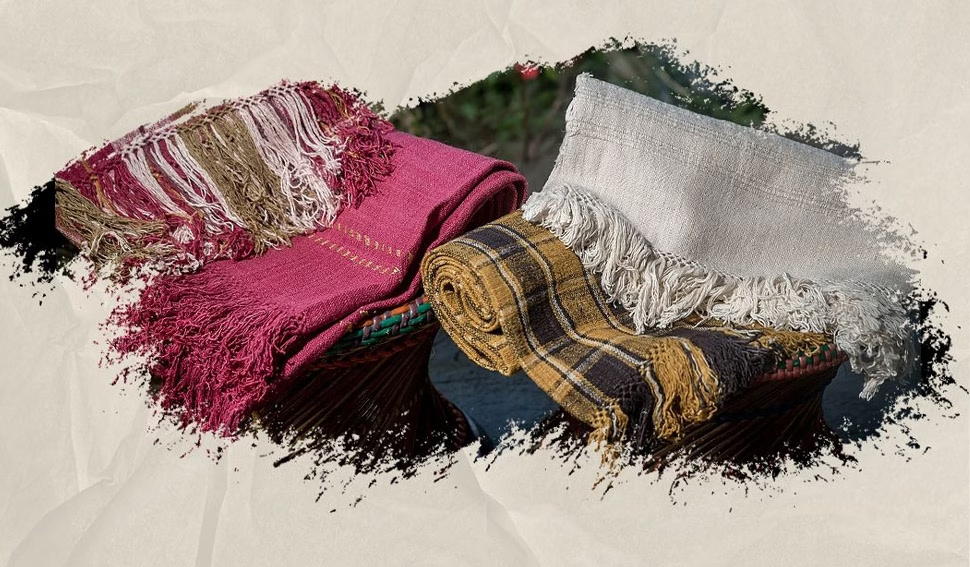Meghalaya’s Ryndia Textile and Handloom Products Receive the GI Tag: A Triumph of Tradition, Culture, and Sustainability
Meghalaya’s Ryndia Textile: In a remarkable and proud moment for India’s Northeast, Meghalaya’s age-old hand-spun, handwoven, and naturally dyed fabric—Ryndia, along with a range of traditional Meghalaya Handloom Products, has officially been granted the prestigious Geographical Indication (GI) tag by the Government of India. This long-awaited recognition is a testament to the rich cultural legacy, exquisite craftsmanship, and sustainable practices rooted in the lush hills of Meghalaya.
The Geographical Indications Registry, under the Intellectual Property Office of India, announced the registration, and details have been made public on the GI Authority’s official website. This is not just a win for the artisans of Meghalaya but a significant leap forward in preserving the unique cultural and textile identity of the region.
Understanding the GI Tag
A Geographical Indication (GI) tag is an intellectual property right that links a product to a specific location, attributing its qualities, reputation, and origin to that geography. Products with GI tags are legally protected from unauthorized use, misrepresentation, or imitation, thereby safeguarding both traditional knowledge and local economies.
With the GI tag, Ryndia and Meghalaya Handloom Products join the prestigious list of Indian treasures like Darjeeling Tea, Banarasi Sarees, and Channapatna Toys, reinforcing the value of India’s indigenous heritage on a national and global scale.
Four Years of Tireless Effort
The journey to secure the GI tag was no easy feat. It took four years of relentless work spearheaded by the Department of Textiles, Government of Meghalaya, with significant support from NABARD (National Bank for Agriculture and Rural Development) and technical guidance from Dr. Rajnikanth, a renowned expert in GI registrations.
Their joint application, in collaboration with the Meghalaya Ryndia Producers Association, culminated in success, marking a historic moment that reflects not just bureaucratic perseverance but a collective desire to uplift traditional weavers and protect indigenous knowledge.
This follows the 2021 declaration of Umden-Diwon as Meghalaya’s first Eri Silk Village, which laid the foundation for structured recognition and commercialization of Ryndia.
A Message of Pride from the Leadership
Meghalaya’s Chief Minister, Conrad K Sangma, expressed his pride and joy over the achievement. Posting on social media platform X, he stated:
“Happy to announce that Meghalaya’s Ryndia silk and Khasi handloom have been recognized with Geographical Indication (GI) tags, highlighting their unique cultural heritage and craftsmanship. This is a great milestone for Handloom Weavers of the state who continue to make commendable efforts to preserve our vibrant indigenous handloom, weaving our story, heritage, and legacy through the years.”
This official acknowledgment brings new hope to thousands of weavers across the state and strengthens Meghalaya’s position in India’s growing handloom and textile economy.
Ryndia: The Ethical Elegance of ‘Peace Silk’
Ryndia, often referred to as Ahimsa Silk or Peace Silk, is a truly special textile. Unlike conventional silk production, which typically involves boiling silkworms alive to extract the fibers, Ryndia is ethically sourced. The silkworms are allowed to complete their natural life cycle, leaving behind the cocoon, from which the silk is then carefully extracted.
Woven primarily by the Khasi, Bhoi, and Jaintia communities, Ryndia is:
- Hand-spun and handwoven
- Naturally dyed using local plants and herbs
- Organically produced with zero use of chemicals
- Durable, breathable, and luxurious in texture
This sustainable, cruelty-free approach has drawn interest from eco-conscious fashion designers and global textile buyers. Whether used for elegant stoles, shawls, or modern garments, Ryndia is versatile and timeless, rooted deeply in the ethos of slow fashion.
Empowering Women, Preserving Culture
What truly makes Ryndia exceptional is the community behind it—especially the women of Meghalaya. For the Khasi tribes, weaving is a revered tradition and a gender-specific occupation, predominantly carried out by women from home. It is both a cultural expression and a source of livelihood.
Women, particularly elderly grandmothers and young mothers, who may not be able to work in the fields, engage in spinning and weaving to support their families. This home-based, skill-driven economy is essential in uplifting rural livelihoods and providing economic independence to women artisans.
Through Ryndia, they are:
- Contributing to household incomes
- Preserving ancient weaving techniques
- Promoting sustainable, eco-friendly practices
- Strengthening Meghalaya’s local economy
Their work not only supports families but also protects the fragile ecological balance of the region, since the dyes, yarns, and tools used are all locally and sustainably sourced.
The Road Ahead: Recognition, Revival & Revenue
The GI tag is expected to open new doors for Ryndia:
- Boosting exports and trade value in national and international markets
- Protecting traditional knowledge from exploitation
- Attracting tourism and cultural curiosity
- Encouraging youth to learn and preserve these traditions
It also means Meghalaya’s handloom sector can now be included in more national schemes and textile expos, bringing its artisans closer to global buyers, designers, and collaborations.
A Living Legacy
Ryndia is more than a textile—it’s a narrative of compassion, culture, and creativity. It reflects how sustainability and tradition can walk hand in hand, creating value not just in economic terms, but also in terms of social equity and environmental responsibility.
This GI tag is a moment of celebration for Meghalaya, and indeed for India, as it showcases how indigenous knowledge and traditional craftsmanship can be preserved, protected, and promoted in the modern world.
With the threads of history, culture, and sustainability woven into its fabric, Ryndia now stands proudly on the global stage, telling the story of a people, their legacy, and their future—one weave at a time.
